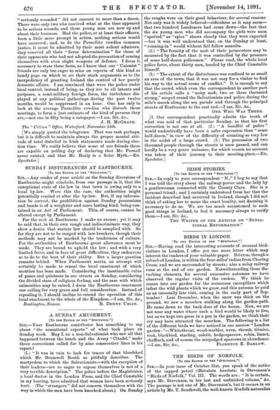A SUNDAY AMUSEMENT.
[To THE EDITOR OF THE "SPECTATOR."] SIR,—Your Eastbourne contributor has something to say about " the sensational reports " of what took place on Sunday week. May I, as a non-Salvationist who saw all that happened between the beach and the Army " Citadel," make three corrections called for by nine consecutive lines in his report?
(1.) " It was in vain to look for traces of that bloodshed which Mr. Bramwell Booth so pitifully describes. The martyrdom to which the Salvationists—with the exception of their leaders—are so eager to expose themselves is not of a very terrible description." The police before the Magistrates, a local doctor in the London Press, and the Chief Constable in my hearing, have admitted that women have been seriously hurt. (The " strangers " did not concern themselves with the way in which the men have been knocked about.) On Sunday
the roughs were on their good behaviour, for several reasons. Not only was it widely believed—ridiculous as it may seem— that two hundred Londoners had come down—the fact that the six young men who did accompany the girls were soon " spotted " as " spies " shows clearly that they were expected —but it was well understood that, on the Sunday at least, " running-in " would without fail follow assaults.
(2.) " The ferocity of the mob of their persecutors may be measured by the fact that it was controlled by the presence of some half-dozen policemen." Please read, the whole local police force, about thirty men, headed by the Chief Constable himself.
(3.) " The extent of the disturbance was confined to so small an area of the town, that it was not easy for a visitor to find his way to the actual scene of conflict." It is enough to say that the crowd, which even the correspondent in another part of his article calls a "noisy mob, two or three thousand strong," surged round the Salvationists and police daring the mile's march along the sea parade and through the principal streets of Eastbourne to the east end.—I am, Sir, &c.,
ONE WHO WAS THERE.
[1. Our correspondent practically admits the truth of what was said of that particular Sunday, so that his first correction is not one at all. (2.) " A handful of police ''' would undoubtedly have been a safer expression than " some half-dozen," in view of the difficulty of counting so very few in the midst of a large crowd. (3.) The procession of two• thousand people through the streets is soon passed, and can hardly be a very grave nuisance, for which reason no account was taken of their journey to their meeting-place.—ED. Spectator.]






































 Previous page
Previous page